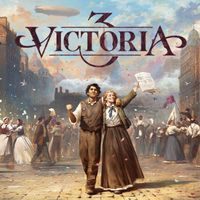Victoria 3: Politics and law - establishing new laws, list
The laws established in your country determine all aspects of society, the functioning of the economy and international relations. The following page of the Victoria 3 game guide will tell you how to introduce new laws and what the consequences of enacting them may be.
This page of our guide will introduce you to the laws you can establish in your country. We explain what categories they're divided into and how does changing laws work.
Establishing laws
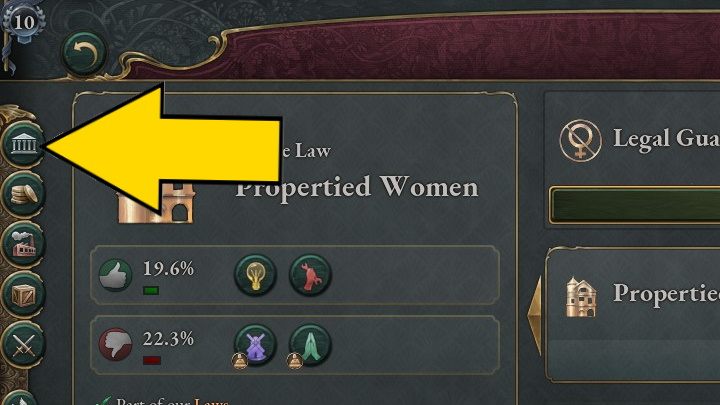
You'll find a list of all laws and options tied to them in the Politics tab, specifically in the Laws section.
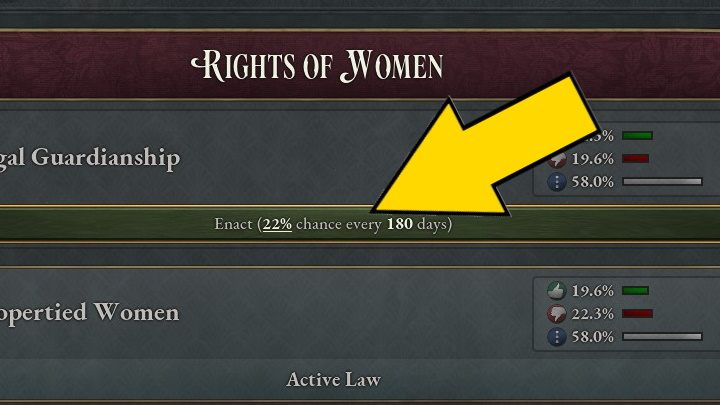
To establish new laws you should select the category you're interested in and click the Enact button.
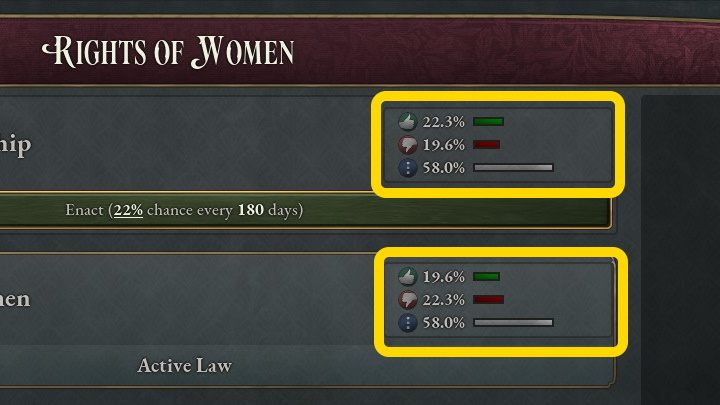
New laws aren't established right away and there's no guarantee it ever will be. Your success depends on the support of Interest Groups. Above we've pictured where you can check the attitude of groups supporting, opposing and indifferent to the new law.
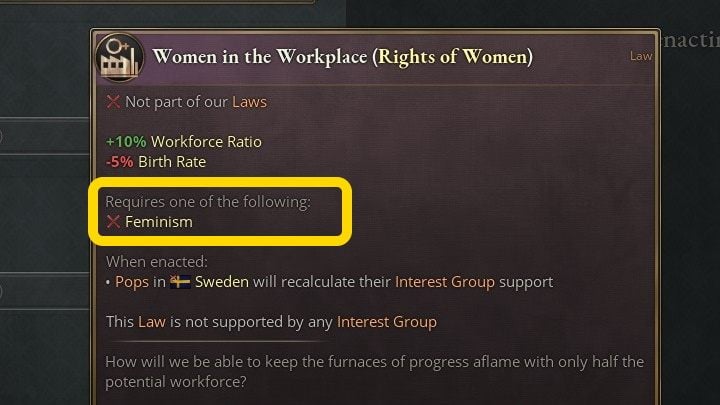
Some laws are unavailable due to the lack of necessary research. You must develop a specific technology to unlock them. As an example: To unlock the Propertied Women law you must first research Feminism.
Power Structure
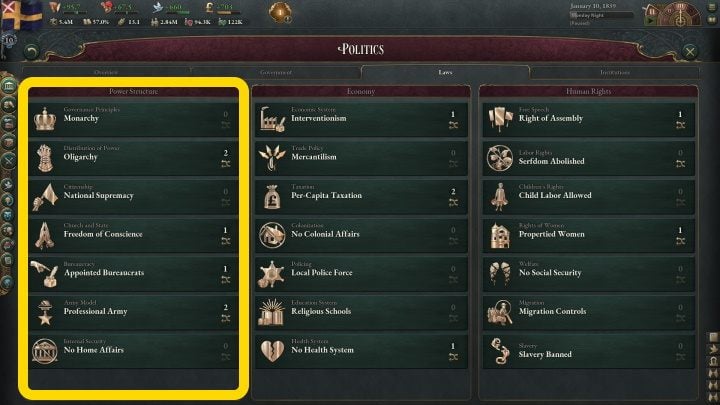
Power Structure laws mainly cover what happens at the governmental and military levels. They're divided into:
- Governance Principles - here you'll settle on your state's political system and which part of the government will actually be the one in power: the monarch, the president, the parliament, the clergy or local governments.
- Distribution of Power - here you'll decide how the authority will be chosen and to whom it will answer. You can decide who'll have voting rights in case of an election. You can also introduce anarchy.
- Citizenship - here you'll define the attitude your state has towards foreign cultures.
- Church and State - here you'll define the relationship between the church and state. You'll decide whether you wish clergy to function as a state organ, limit or prohibit their interference in state affairs.
- Bureaucracy - here you'll decide how bureaucrats will be appointed to their office. They can either inherit their positions, be appointed by the government or elected in local elections.
- Army Model - here you'll decide how the state conscripts soldiers. Your choice will affect the army's size and capabilities.
- Internal Security - here you'll decide whether you want government forces to keep surveillance on the citizens, suppress riots or only consider individual complaints.
Economy
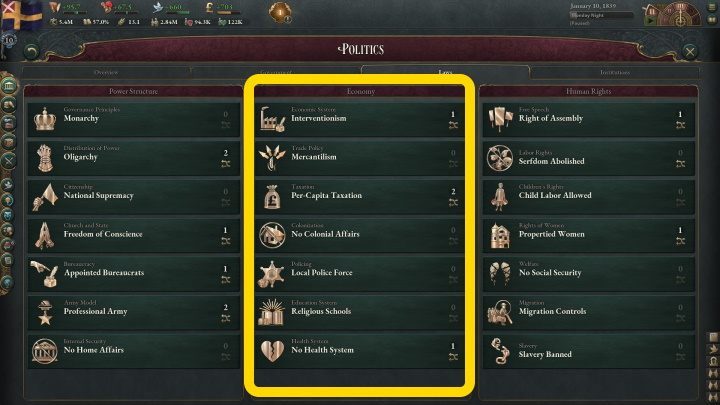
Economy laws determine the political direction of your state's industry, services, healthcare and education systems. They're divided into:
- Economic System - here you'll define the extend to which the government will interfere in the operation of agricultural businesses.
- Trade Policy - here you'll define the freedoms and restrictions tied to trade. You can decide whether you want to distribute goods only locally or export them to other countries.
- Taxation - here you'll decide which interest groups to charge with the highest taxes and whether the taxes are fixed or based on income.
- Colonization - here you'll decide whether you want your country to establish colonies. If so, you'll also define their nature. You can use colonies for migration and resource exploitation.
- Policing - here you'll decide how specialized and equipped you wish your police force to be. You can also disband law enforcement completely.
- Education System - here you'll define the type of schools available to the public. These can be religious, private or public schools.
- Health System - here you'll decide how the hospitals should be run, who will receive healthcare and what kind of healthcare they'll receive.
Human Rights
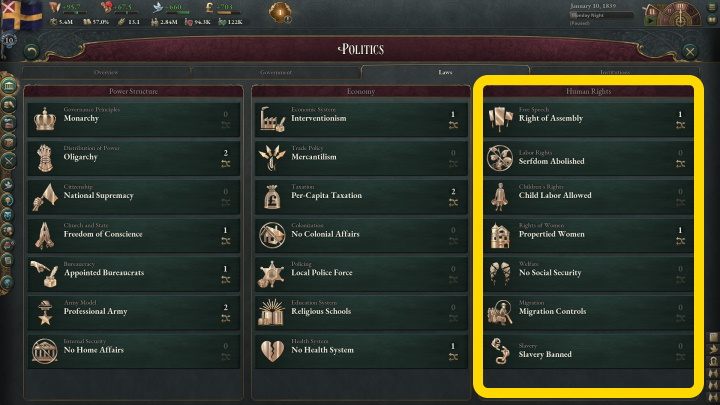
Human Rights laws determine how free your citizens are. They're divided into:
- Free Speech - here you'll decide whether to enforce censorship, let people rally freely or ban any criticism of the government.
- Labor Rights - here you'll decide whether the state will protect their workers or force them into serfdom.
- Children's Rights - here you'll decide whether to allow workplaces to employ children and whether to make basic education a requirement.
- Rights of Women - here you'll decide whether to give women voting rights, right to work and ownership.
- Welfare - these regulations are tied to pensions, wage subsidies and protecting the poor.
- Migration - here you'll define whether the state will control who can leave or enter the country, close the borders entirely or let everyone pass through freely.
- Slavery - here you'll decide whether your state supports slavery. If it does, you'll also decide how exactly it functions.
- Victoria 3 Guide
- Victoria 3: Game Guide
- Victoria 3: Basics
- Victoria 3: Tips and Tricks
- Victoria 3: Game modes
- Victoria 3: Game interface
- Victoria 3: Technologies - Technology Tree, Innovations
- Victoria 3: Finances - money, gold reserves
- Victoria 3: Politics and law - establishing new laws, list
- Victoria 3: Formable Nations - list of all
- Victoria 3: Start and End dates
- Victoria 3: How to enable Ironman Mode?
- Victoria 3: Basics
- Victoria 3: Game Guide
You are not permitted to copy any image, text or info from this page. This site is not associated with and/or endorsed by the developers and the publishers. All logos and images are copyrighted by their respective owners.
Copyright © 2000 - 2025 Webedia Polska SA for gamepressure.com, unofficial game guides, walkthroughs, secrets, game tips, maps & strategies for top games.
